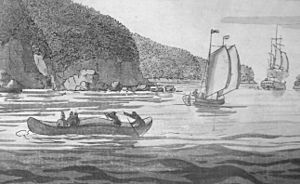R v Marshall facts for kids
The cases of R v Marshall (No 1) [1999] 3 S.C.R. 456 and R v Marshall (No 2) [1999] 3 S.C.R. 533 were very important decisions made by Canada's highest court, the Supreme Court of Canada. These decisions, both from 1999, were about the right of Indigenous peoples to fish. This right comes from old agreements called treaties.
The First Decision: Fishing Rights Confirmed
In the first decision, the Court looked at the case of Donald Marshall Jr.. He had caught and sold eels. The Court decided that his actions were allowed under treaties made in 1760 and 1761. These agreements were between the Mi'kmaq people and Britain.
The Court said that certain government rules about fishing seasons and needing licenses went against these treaty rights. This meant that the Mi'kmaq people had a special right to fish and sell their catch.
Later, in 1999, a higher court looked at Marshall's case again. They found that the first judge had made a mistake in how they understood the law. Justice Binnie, the appeal judge, said the mistake was not focusing enough on a specific treaty from 1760.
The Second Decision: Clarifying the Rules
In its second decision, the Supreme Court explained more about Indigenous treaty rights. They said that these rights can still have rules applied to them. This happens if there is a real concern about protecting fish populations. It can also happen if other important public needs are involved.
Both of these decisions caused a lot of discussion and strong feelings. The first decision made some non-Indigenous fishing groups upset. They felt it gave Indigenous peoples too much freedom to fish.
The second decision was called an "explanation" of the first. But many Indigenous communities felt it was a step back from the first decision. This made them upset. The Court issued the second decision after other fishing groups asked for the case to be looked at again. The Court then explained more about how treaty rights and fish conservation work together. This was something that was only hinted at in the first decision.
Learn More
- Burnt Church Crisis
- Burying the Hatchet ceremony (Nova Scotia)
- Canadian Aboriginal case law
- The Canadian Crown and First Nations, Inuit and Métis
- Exclusive Economic Zone
- Indian Act
- Indian Health Transfer Policy (Canada)
- Numbered Treaties
- R. v. Marshall; R. v. Bernard
- Section Thirty-five of the Constitution Act, 1982
- Treaty Day (Nova Scotia)
- 2020 Mi'kmaq lobster dispute
 | Bessie Coleman |
 | Spann Watson |
 | Jill E. Brown |
 | Sherman W. White |


